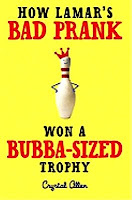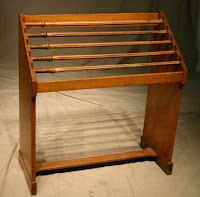Nonfiction Monday is organized by Anastasia Suen and hosted today at
Apples with Many Seeds.

Gifford, Clive.
Cooking in World Cultures series from
Powerkids Press.
This series includes
Food and Cooking in Ancient Egypt;
Rome; and
Greece, and also
Food and Cooking in Viking Times, which I did not read.
These very short (32 pages) cookbooks are very well done, and something which I needed for the projects which are frequently assigned. It is nice that they all give an overview of the way food was cooked, what foods were available, and also have some easy recipes of foods that are exotic but which students might actually eat. I'm still looking for a slightly longer version of these, with more recipes and more scholarly notes, but these will get a lot of use.

Jeffers, H. Paul.
Legends of Santa Claus.This overview of the different myths surrounding everyone's favorite gift giver starts with a description of NORAD's yearly reports of Santa's wherabouts, and continues to follow his development from ancient times to modern. Clever anecdotes abound, including one about Richard E. Byrd telling his children that he would find evidence of Santa when he traveled to the North Pole. Illustrated.
Strengths: Complete and well-researched, with a good, clear overview.
Weaknesses: Clement Clark Moore most likely did not write
The Night Before Christmas; Don Foster's work about this came out at the same time that this book was published. I would have thought that Lerner would have updated this information.

Fleming, Candace.
Amelia Lost: The Life and Disappearance of Amelia Earhart.Why is Amelia so appealing even after all these years? She was a canny business woman and did a great job with her publicity! Fleming does another outstanding job of researching all the little known facts about Earhart and putting them together in an intriguing way-- we start with the disappearance and then go back to her early life, then read a little more about the disappearance, etc., so there is some tension even though we know what is going to happen. I did not know that there was someone who supposedly heard Earhart on the radio, nor that she curled her hair into its signature "tousled" look. When I was young, we still thought Amelia might be found; she would be long dead by now!
Strengths: Graphically pleasing, well illustrated and well researched.
Weaknesses: Some students might have trouble going back and forth in time.

Lusted, Marcia Amidon.
Social Networking: MySpace, Facebook and Twitter. Abdo Publishing.
From the Technology Pioneers series, this volume covers the beginnings of the social networking phenomenon. The backgrounds of the founders and early days of the company are discussed against the technologic climate at the time, and problems are not glossed over. This is a good length, graphically pleasing, and should be one that students will pick up for some time. I rarely buy books on technology because they date so quickly, but this clearly is about the beginnings of these sites, so will keep for a while.
Had an odd weekend with a lot of hauling people around and waiting, and had a small death march through some books. Of note: library books are far more compelling than either ARCs or E-ARCs, especially when they have "new" stickers on them and I know there is only a two week loan!

Harris, Lewis.
A Taste for Red.Stephanie (who prefers to go by Svetlana, now that she is in touch with her dark side) starts to realize that her science teacher stinks. This is because Svetlana is an Olfactive, who can smell vampires (They smell like decaying meat. Lovely.) When classmates go missing, Svetlana investigates, helped by a neighbor and some friends.
Strengths: This is great for younger readers who are obsessed with vampires. Rather like the Poison Apple books, this is a cross between Vampire Kisses and a mystery. Attractive cover.
Weaknesses. More vampires. Sigh.

Lancaster, Mike A.
Human .4After being hypnotized at a village talent show, Kyle and three other people from his town notice the strange behavior that follows the complete catatonia that has struck everyone else. It turns out that Kyle and people like him are earlier versions of humans, and the vast majority of humanity has been upgraded and can no longer detect earlier versions. Presented as notes taken on old fashioned audiotapes, it includes explanations of references to popular culture.
Strengths: Like Brain Jack, the idea that human brains can be connected like computers is interesting, and it's a unique spin on science fiction.
Weaknesses: This is a rather slow moving book, and the sort that I didn't quite understand what was going on until halfway through.

Allen, Crystal.
How Lamar's Bad Prank Won a Bubba-Sized Trophy.Lamar loves to bowl, but his father only cares about his brother, who is a star basketball player. Things are tough in the household because Lamar's mother passed away when he was younger, and his father is having work cuts that limit the family's money. When the Billy Jenks, who is constantly in trouble, offers Lamar a chance to make a lot of money by playing with him in games people bet on, Lamar thinks he has something good going, until he realizes that his bowling idol, Bubba Sanders, would not approve.
Strengths: Fun language, snappy scenes, bowling, and an African American main character in the Heartland. I debated whether a picture of Lamar would be good-- could not decide. This cover is good. I also liked the realistic consequences and the supportive adults in this.
Weaknesses: While Lamar's funny style of speaking is appealing, I got a little tired of some of his catch phrases. ("Crackers and cream cheese")

Runholt, Susan.
Adventure at Simba Hill.This third book (
The Mystery of the Third Lucretia and
Rescuing Seneca Crane) takes Kari and Lucas to Africa where Kari's uncle is working on an archaeological dig. When they start to suspect that artifacts from the dig are being stolen and shipped to England, the pair spring into action.
Strengths: There aren't a lot of mystery series, and Kari and Lucas are appealing characters.
Weaknesses: Didn't like this one as well as the others; the safari-like setting seemed oddly luxurious, and the girls couldn't be on their own as much as they were in Scotland. Still, I'll look forward to the next book.

Selfors, Susanne.
Mad Love.
Alice's mother is a well-known romance writer, but after years of struggling with bipolar disorder, is in a mental hospital. Trusted neighbors are checking in with Alice, who is trying to hide her mother's illness from the world, but when money runs out and her mother's publishers want the $100,000 advance for the next book back, Alice needs to find a plan. This plan emerges in the form of Errol, a young man who gives her a manuscript and tells her that he is, in fact, Cupid, and that the story is about his true love, Psyche. At first, Alice is sure that Errol is nuts, but starts to believe him. While pursuing a romance with hot skater boy Tony, she starts to write the story, deal with her mother's illness, and find some direction in her own life.
Strengths: As in
Coffeehouse Angel, Errol's appearance is not really explained or excused; we're just supposed to believe it. Considering that the rest of the book is so realistically done, this gives the book a nice zing. It also is a book that will appeal to older girls but is okay for younger ones. (There is one mention of sex, but it's just that; something like "If I wanted to have sex with you, we'd have had it already." Sorry. Can't find the page.)
Weaknesses: A little slow in the middle.
It was warm enough to sleep with the window open last night, and the air smelled like flowers this morning. Could it be that spring has come to Ohio?
 Yolen, Jane. Prince Across the Water.
Yolen, Jane. Prince Across the Water. Wyatt, Melissa. Raising the Griffin.
Wyatt, Melissa. Raising the Griffin. Burnham, Niki. Royally Jacked.
Burnham, Niki. Royally Jacked. O'Connell, Tyne. Pulling Princes.
O'Connell, Tyne. Pulling Princes.















































